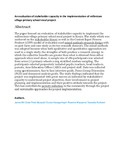An evaluation of stakeholder capacity in the implementation of millenium village primary school meal project
Date
2018-10-06Author
Oudaa, James Bill
Mulaudzib, Peter
Najoli, Eunice Kanaga
Wanyama, Roseline
Runhared, Tawanda
Metadata
Show full item recordAbstract
The paper focused on evaluation of stakeholder capacity to implement the millennium village primary school meal project in Kenya. The study which was anchored on the stakeholder theory as well as the Context Input Process Product (CIPP) model of evaluation used mixed methods research design with ex-post facto and case study as its two research elements. The mixed methods was adopted because when both qualitative and quantitative approaches are used in a single study, the strengths of both produce a research synergy in which the collective benefits are greater than what is obtained from either approach when used alone. A sample size of 186 participants was selected from seven (7) primary schools using stratified random sampling. The participants selected purposively included pupils, teachers, head teachers, parents, Area Education Officer (AEO) and project staff. Data was collected using questionnaires, face to face interview guide, Focus Group Discussion (FGD) and document analysis guide. The study findings indicated that the project was implemented with great success as indicated by stakeholders’ capacity to understand project objectives, their involvement in project planning and implementation and their positive attitude towards the project. This has contribute to poverty reduction in the community through the project and sustainable approaches for project implementation.
URI
https://doi.org/10.1016/j.evalprogplan.2018.10.003https://www.sciencedirect.com/science/article/abs/pii/S0149718918300454
Collections
- Gold Collection [989]

